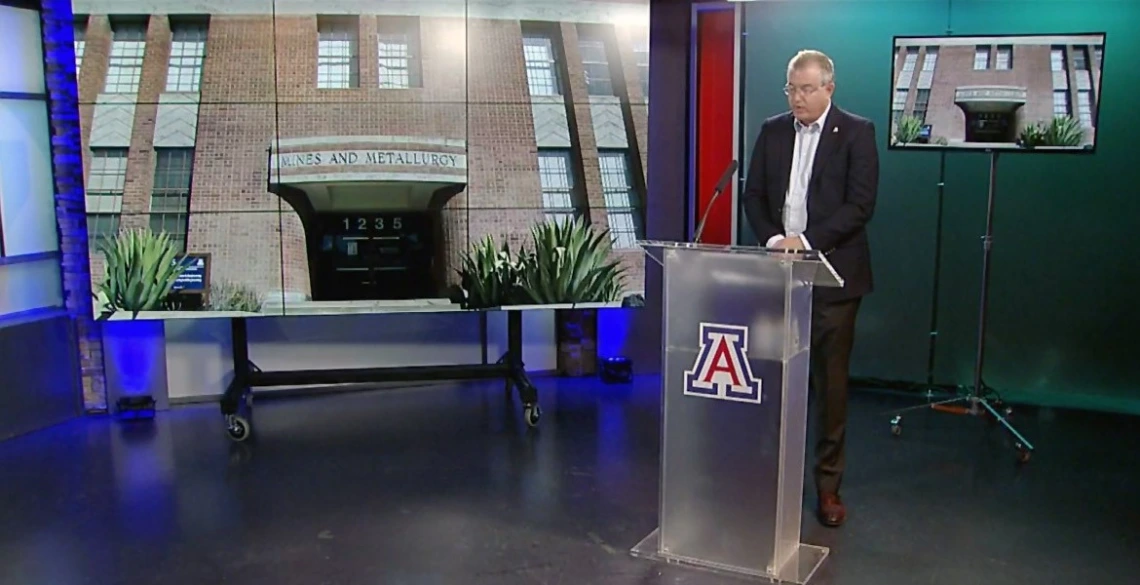First Virtual Homecoming Celebrates Alumni and Diversity
The University of Arizona put the “home” in Homecoming this year with a series of virtual celebrations.

David W. Hahn, Craig M. Berge Dean of the College of Engineering, welcomes guests to the Engineers Breakfast.
At the virtual Engineers Breakfast on Friday, Nov. 13, David W. Hahn, Craig M. Berge dean, spoke for a moment about what the world was like 50 years earlier, when the Class of 1970 graduated.
Gas was 36 cents a gallon, for one. The famous phrase, “Houston, we’ve had a problem” was uttered. The average annual income in the United States was $9,400. The last 50 years have seen a multitude of changes, and perhaps few years have brought more change than 2020.
Nevertheless, there are some things that have remained the same, as Lindsay Koelbel, president of the Engineering Student Council, mentioned in her opening remarks.
“Although we face new challenges this year, our school is not defined by the buildings we learn in, but by the people who continue to work hard for our students and the world around us,” she said. “Engineering at the University of Arizona is not simply about earning a degree. It is about applying our skills to real-life problems and tackling the hardest challenges.”
A Seat for Everyone at the Table
Hahn spoke about how the annual event is a celebration of the college’s people, who all contribute unique perspectives.
“I see every day how the richness of experience and background makes us a better college,” he said. “I also hear regularly from leaders in industry and government that their future success depends on the ability to attract the next generation of talent. I want that talent to be Wildcat Engineering talent. And to meet those needs, it’s necessary to attract students and faculty members from all walks of society.”
For example, he said, the college recently established a scholarship fund specifically for transfer students, who often come from less financially privileged backgrounds than other students. Worldwide, enrollment in higher education has decreased considerably during the pandemic. Yet, the College of Engineering has seen only slight drops, and transfer student enrollment has increased significantly.
Guest speaker and 1971 mechanical engineering graduate Gary Harper shared his story about being a community college transfer student.
“The experience provided me with one more year of maturity that served me quite well,” he said, urging others to consider the option.
Keynote speaker Joaquin Martinez, who grew up in poverty and earned a civil engineering degree in 1993, said that during his career in the global oil and gas sector, he’d found that talent was evenly distributed across the world, but opportunities were not.
“When you see somebody who comes from an underprivileged background, they’ve had to overcome some incredible obstacles to get to be in front of you,” Martinez said. “They’ve adapted and had to cultivate some survival skills. Because of the environment we’re in, there are so many businesses that are struggling to survive, so wouldn’t it be handy and helpful to have somebody with these survival skills on your team?”
Recognizing Awardees and Scholarship Recipients
Guests included a range of alumni and students, from Wildcat Engineers at the start of their academic journeys to retiring professionals, like Martinez and Harper, now supporting and mentoring those following similar paths.
The 2020 alumni awardees, listed below, continue to give back to the college and society in many ways, including through generous scholarships.
- Alumnus of the Year: Thomas W. Peterson (MS chemical engineering, 1974)
- Professional Achievement Award: Kristina Swallow (BS civil engineering, 1994)
- Outstanding Young Alumni Volunteer: Brody Rastall (BS and MS mining engineering, 2018 and 2019)
- Young Alumni Professional Achievement Awardee: Andrew Friedman (BS systems engineering, 2009)
A short video featured scholarship recipients, including a single mother, transfer student, and young man who traveled 1,500 miles from home to attend college. First-generation college student and daughter of immigrants Denise Renteria was among those who shared their stories.
“My parents raised me that you have to work really hard to get what you want,” said the civil engineering junior. “I’m beyond grateful for having these scholarships.”
Honoring the ‘GOAT’ of Ore Finding
The college’s virtual Homecoming events also included presentations on research, updates from department heads, and tributes to the greats.
The Department of Mining and Geological Engineering’s 15th Annual W.C. Lacy Distinguished Lecture paid homage to alumnus J. David Lowell, who discovered the world’s largest copper deposit and is considered the most successful mineral prospector of the past century. Lowell died recently at the age of 92. Fellow alumnus Tom O’Neil called him the greatest of all time, or “GOAT” of ore finding.
“And that legacy lives on today,” he said.
Lowell and his wife are namesakes for the Lowell Institute for Mineral Resources, Lowell Program in Economic Geology, and David & Edith Lowell Chair in Mining and Geological Engineering.
Mary Poulton, professor emerita and former head of mining and geological engineering, recalled her amazement the first time she saw Lowell in person, after reading about him as a legend in the pages of textbooks.
“His guidance, his advice, his perseverance, his patience really transformed my life and career, and permanently transformed the minerals programs at the University of Arizona,” she said.

